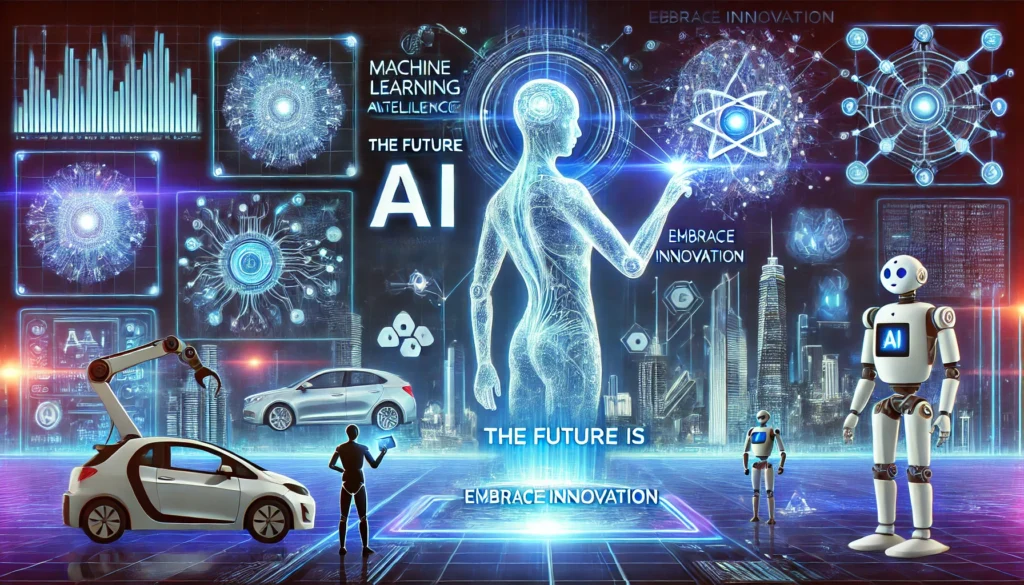Artificial Intelligence (AI) is no longer just a concept from science fiction—it is a reality shaping our present and defining our future. From automation and machine learning to natural language processing and robotics, AI is transforming the way we live, work, and interact with technology. In this blog, we will explore how AI is revolutionizing various industries and what the future holds for this groundbreaking technology.
1. AI in Everyday Life
AI has seamlessly integrated into our daily lives, often without us realizing it. Here are some common examples:
- Virtual Assistants: AI-powered assistants like Siri, Google Assistant, and Alexa help users perform tasks through voice commands.
- Smart Recommendations: Platforms like Netflix, YouTube, and Spotify use AI to suggest content based on user behavior.
- Autonomous Vehicles: AI-driven self-driving cars from companies like Tesla are redefining transportation.
- Smart Home Devices: AI-enabled gadgets like smart thermostats, security cameras, and IoT devices are making homes more efficient.
2. AI in Business and Automation
Businesses worldwide are leveraging AI to optimize processes, improve decision-making, and enhance customer experiences. Key applications include:
- Chatbots and Virtual Support: AI-powered chatbots provide instant customer support and automate responses.
- Predictive Analytics: AI helps businesses analyze large datasets to predict market trends and consumer behavior.
- Robotic Process Automation (RPA): AI-driven bots automate repetitive tasks, increasing efficiency and reducing costs.
- AI in Finance: AI assists in fraud detection, risk assessment, and algorithmic trading in financial institutions.
3. AI in Healthcare
The healthcare industry is experiencing a major AI-driven transformation, leading to improved patient care and medical advancements:
- AI Diagnostics: Machine learning algorithms detect diseases such as cancer and heart conditions with high accuracy.
- Drug Discovery: AI speeds up drug development by analyzing vast amounts of biochemical data.
- Personalized Medicine: AI tailors treatments based on a patient’s genetic makeup and medical history.
- Robotic Surgery: AI-powered robotic systems assist surgeons in performing precise and minimally invasive procedures.
4. AI and Cybersecurity
As digital threats grow, AI is playing a crucial role in cybersecurity:
- Threat Detection: AI-powered security systems identify and neutralize cyber threats in real time.
- Fraud Prevention: Banks and e-commerce platforms use AI to detect suspicious transactions.
- Automated Security Responses: AI can take preventive actions against security breaches before they escalate.
5. The Future of AI: What’s Next?
AI is evolving rapidly, and the future holds some exciting advancements:
- Generative AI: Tools like ChatGPT and DALL·E are enhancing content creation, from text to images and videos.
- AI in Education: Personalized learning experiences will help students grasp concepts at their own pace.
- AI-Powered Healthcare Assistants: AI could soon act as virtual doctors, diagnosing illnesses and recommending treatments.
- Quantum AI: The fusion of AI and quantum computing could lead to unprecedented computational power, solving complex problems faster than ever.
- Ethical AI Development: As AI becomes more advanced, ensuring ethical AI practices, fairness, and unbiased decision-making will be a key challenge.
Final Thoughts
Artificial Intelligence is revolutionizing technology, making our lives more efficient, productive, and connected. As AI continues to advance, businesses, developers, and individuals must stay updated with the latest trends and challenges. While AI offers immense potential, it also brings ethical and security concerns that must be addressed.
Are you excited about the future of AI? Share your thoughts in the comments below!







Comments